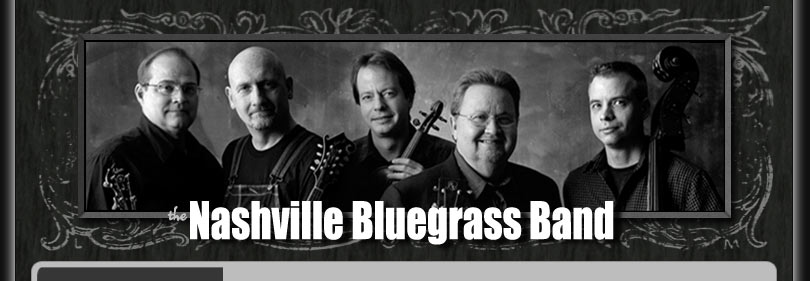NBB...
Considering how many fiddle and banjo groups have formed in Music City, it’s a wonder some ordinary hackers didn’t make off with the name Nashville Bluegrass Band. Instead, providence reserved that simple, profound moniker for one of the few bands that could live up to it.
Beholden neither to first generation conservatism nor newgrass eclecticism, the Nashville Bluegrass Band has truly forged its own sound, one rooted in the blues with an acute awareness of gospel and folk traditions. Their music has an ease to it that contrasts with the edgy fire-balling of some contemporary bluegrass bands. Instead, when Alan O’Bryant and Pat Enright match their voices in close harmony and when mandolinist Mike Compton and fiddler Stuart Duncan offer their refined compliments to the songs, a certain mood is created, one discovered early on and refined over two decades of history.
They formed in 1984 to support a tour by country veteran Vernon Oxford and Grand Ole Opry comedienne Minnie Pearl. O’Bryant, Enright and Compton were founders; Duncan came along not long after. NBB may have benefited from the fact that it was never the sole outlet for its musicians. All have been in-demand session men who were thus able to bring a range of experience and growth to the band when it came time to perform or record.
At the heart of the NBB sound is Pat Enright’s complex voice, mournful and joyful at the same time, a beacon of the blues. His solo take here on Biggest Liars In Town is ripe with tension and pathos. And when Enright and O’Bryant sing together, as on the gallant and heart-sick title track of their celebrated album Waitin’ For The Hard Times To Go, it’s profoundly moving.
While several bass players have moved through the NBB lineup over the years, it’s been a rather stable group, the biggest change being a stretch when Mike Compton was replaced by Roland White (Compton returned a few years ago). Each brought a certain character to the band while supporting the essential NBB swing. Duncan’s fiddling is a wonder in itself, hard-core and dark at times, nimble and modern at others.
The NBB has followed its muses far and wide. They’ve been among the first to pick up on the material of important young writers like Gillian Welch and Kate Campbell. They sought out and worked extensively with gospel greats The Fairfield Four. They’ve played the White House and around the world, including shows in China, Iraq, Bangladesh and Bahrain. They’ve wowed the crowd at Carnegie Hall. And disguised as the Soggy Bottom Boys, they were an integral part of the most significant event in roots music of the past ten years, the multi-platinum soundtrack of the film O Brother, Where Art Thou? and the Down From The Mountain tour that followed.
The accolades have been many, including two Grammy Awards for best bluegrass album and two Entertainer of the Year nods from the International Bluegrass Music Association. But to hear them live, one suspects the most rewarding part of the NBB effort is their effortless ensemble feeling, something musicians can spend a lifetime looking for. The members of NBB are each great players, but they embrace the band ideal with humility and consummate skill, which is why they represent Nashville and bluegrass so well.
Craig Havighurst
Nashville, March 2007
